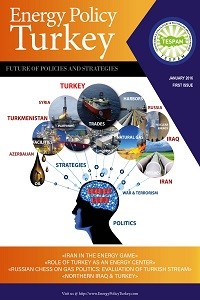Öz
Kaynakça
- 1. Avrupa Birliği, Türkiye 2015 İlerleme Raporu. 2. Elektrik Enerjisi Piyasası ve Arz Güvenliği Strateji Belgesi. 3. Enerji ve Tabii Kaynaklar Bakanlığı, 2014 Yılı Amaç Ve Hedefleri Kitapçığı. 4. Enerji ve Tabii Kaynaklar Bakanlığı, 2015 Yılı Bütçe Sunumu. 5. Enerji ve Tabii Kaynaklar Bakanlığı, 2015-2019 Stratejik Planı. 6. Avrupa Birliği Bakanlığı, Avrupa Birliği Sürecinde Enerji Faslı Kitapçığı. 7. Enerji Verimliliği Strateji Belgesi 2010-2023. 8. John Roberts, Güney Gaz koridoru Enerjide Yeni Çözüm. 9. Enerji ve Tabii Kaynaklar Bakanlığı, Nükleer Güç Santralleri ve Türkiye. 10. WWF, Türkiye’nin Yenilenebilir Gücü: Türkiye için Alternatif Elektrik Enerjisi Arz Senaryoları, 2014. 11. Enerji ve Tabii Kaynaklar Bakanlığı, Türkiye Ulusal Yenilenebilir Enerji Eylem Planı, 2014.
Öz
One of the never-ending discussion
topics in today’s modern time is doubtlessly energy supply. Energy gained even
more value with the industrial revolution; nowadays it maintains its importance
as an element of strategic balance. Although energy resources are not dispersed
homogeneously of the earth's surface, global demand for energy supplies is
constantly increasing that allows energy to be used as a strategic weapon.
Countries, which are dependent on foreign energy, are on the target of this
weapon. Unfortunately, Turkey is one of those countries.
By advances in
technology, economical usage of alternative energy resources has been a glimmer
of hope for energy-strapped countries. The overall interest for energy systems,
producing energy just with the costs of installation and maintenance (without incurred
resource costs), is increasing. Considering the fossil energy resource limits, the
importance of renewable energy sources can be better understood.
Turkey is not rich in
fossil energy resources but has high potential for renewable energy sources. On
the other hand, it has a geopolitical location that serves as a bridge between
producer and consumer countries in terms of fossil energy resource transmission.
It currently hosts various in-use and ongoing oil and natural gas pipeline
projects. Turkey holds a unique position between Europe and Asia that has been
playing a critical role for centuries. It should eliminate dependency on
foreign energy for several reasons, for instance, survival in energy sector,
increasing the power in energy domain, becoming a regional dominator.
Turkey should establish
stable policies and develop new investments and projects to provide the
low-cost energy. That way, Turkey will have the chance to thrive, to reduce
foreign dependence, to get rid of political pressure, and to protect its
strategic importance. For these reasons, Turkey currently faces a multi-objective-decision-making-problem.
Cases that deal with many
conflicting objectives to reach the most appropriate decision-making are
described as multi objective decision problems. For the solution of these
problems, at first, objectives are determined, and then alternatives that serve
those objectives are evaluated. The conflicting objectives are balanced by a
set of alternative solutions that maximize total benefits.
Assessing the energy
investments, projects and policies with decision-making methodologies can be
useful for revealing and interpreting the energy dynamics of Turkey.
Anahtar Kelimeler
Kaynakça
- 1. Avrupa Birliği, Türkiye 2015 İlerleme Raporu. 2. Elektrik Enerjisi Piyasası ve Arz Güvenliği Strateji Belgesi. 3. Enerji ve Tabii Kaynaklar Bakanlığı, 2014 Yılı Amaç Ve Hedefleri Kitapçığı. 4. Enerji ve Tabii Kaynaklar Bakanlığı, 2015 Yılı Bütçe Sunumu. 5. Enerji ve Tabii Kaynaklar Bakanlığı, 2015-2019 Stratejik Planı. 6. Avrupa Birliği Bakanlığı, Avrupa Birliği Sürecinde Enerji Faslı Kitapçığı. 7. Enerji Verimliliği Strateji Belgesi 2010-2023. 8. John Roberts, Güney Gaz koridoru Enerjide Yeni Çözüm. 9. Enerji ve Tabii Kaynaklar Bakanlığı, Nükleer Güç Santralleri ve Türkiye. 10. WWF, Türkiye’nin Yenilenebilir Gücü: Türkiye için Alternatif Elektrik Enerjisi Arz Senaryoları, 2014. 11. Enerji ve Tabii Kaynaklar Bakanlığı, Türkiye Ulusal Yenilenebilir Enerji Eylem Planı, 2014.
Ayrıntılar
| Konular | Ekonomi |
|---|---|
| Bölüm | Makaleler |
| Yazarlar | |
| Yayımlanma Tarihi | 30 Ocak 2016 |
| Yayımlandığı Sayı | Yıl 2016 Sayı: 1 |
Kaynak Göster
Energy Policy Turkey is a Trade Mark of TESPAM


